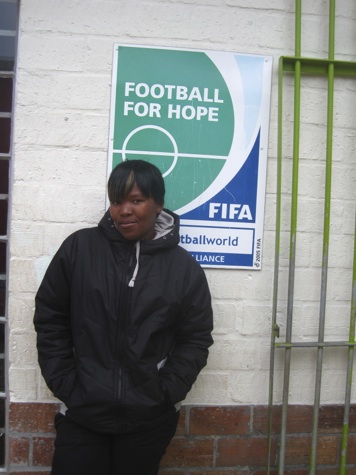SKILLZ Street, GRS’s female-specific program, was designed purposefully to empower female participants and teach them about their particular vulnerabilities and the role they have in HIV transmission. The curriculum is focused on positively impacting participants and allowing them to be leaders on these issues in their own communities. However, there is often a secondary effect: the program encourages our SKILLZ Coaches to live the messages they coach, inspiring them to make positive changes in their own lives and for their communities. GRS SKILLZ Street Coach Namhla Sibeko shared her thoughts on how being a GRS Coach has changed her outlook on gender issues:
“Being a Coach has changed the way I see things; it changed the way I thought about people in abusive relationships. Before I was a Coach, I grew up in an environment with an abusive father and my mother never complained about it. Because of this, I always thought it was okay for a guy to hit a girl, and if I was ever in that situation, I would never say anything to stand up for myself and only fight back, like my mother used to. But now because of SKILLZ Street, I know it is not okay for that to happen and I know I can stand up for myself; I know how to get help if he continues to hurt me.
It is because of SKILLZ Street that I know more about girls’ vulnerability to HIV and I feel confident talking about it in front of the girls.
Ever since I started doing SKILLZ Street, I’ve seen positive changes in the girls from my own community. I saw that the girls didn’t know how to express their feelings to their mothers but because of SKILLZ Street, they can talk to their female family members and they have more knowledge about how to protect themselves from HIV and STIs. I can see the knowledge being instilled in their minds and it is helping them make positive choices. As a Coach, I’ve seen that kids see the way you approach them or the way that you talk to them and when you do a Coach’s Story [one of the lessons in the SKILLZ curriculum involves Coaches telling a personal story about how HIV or a related issue has effected their lives], it helps them relate their lives to your own. When they hear the story, you think maybe one of the kids is facing the same situation in their own lives. When that happens, they come to you and ask advice because we become someone who they can talk to. I’ve even had a girl come over to my house and we had dinner together. They know that I cannot judge them because I always tell them, ‘Girls, if you have any problems, just come to me and I will make sure I will find a solution for you.'”
